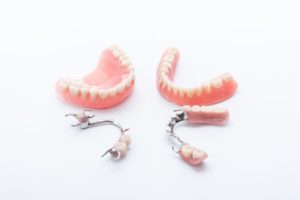
More than 50,000 people in America will be diagnosed with oral cancer this year and nearly 10,000 will die from it. Even with medical advancements, these figures have not improved much in many years. Believe it or not, one of the major risk factors is actually poorly fitting dentures!
They won’t cause oral cancer but slipping dentures in conjunction with poor oral care can lead to damage that causes the cells in your mouth to become cancerous. On a positive note, there are many signs that let you know it is time to either reline your dentures, replace them, or pivot to implant dentures.
How Can I Tell Visually That My Dentures Need a Reline or Replacement?
If you encounter any of the following issues, realize that you need to address your denture situation:
- Stains: Look for stains when you clean your dentures. Your dentist can counteract most types of discoloration. When you see them about that, ask if you would be better off replacing them.
- Oral sores: Raw patches of tissue and canker sores may be due to fissures in the surface of your dentures, which is a sign to act.
- Gum irritation: While this should not occur once you are used to your dentures, if it does, it may indicate a defect on their surface.
- Pressure sores: They result from slipping dentures and offer evidence that your dentures need to be relined.
- Changes in facial shape: Your dentures play a role in keeping your cheeks looking full and even just like natural teeth. If you notice changes in your jawline or cheeks, your dentures probably need to be relined.
- Cracks or chips: You don’t have to lose an entire tooth to downgrade the functionality of your dentures – cracks and chips need to be fixed, too. They create surfaces that can cut or irritate oral tissues.
- Broken teeth: If this happens, do not try to reattach a tooth yourself, since it could result in an irregular fit and future problems.
What Nonvisual Clues Hint That You Need a Denture Reline?
Not all warning signs about a needed denture reline or replacement are seen; here are some other indicators:
- Lingering odors: If you find that odors are lingering even after you’ve thoroughly cleaned your dentures, this can mean there’s a defect in the material.
- Changes in speech pattern: If you experience excessive salivation, lisping, or slurred speech well after you received your dentures, you may need a reline.
- Fit changes: Your top denture should have a smooth suction to your gums, while your bottom denture should float above your gums but stay in your mouth easily. Partial dentures need to stay in line with your teeth without having any significant movement.
- Discomfort: If you notice uneven pressure, jaw soreness, or very sharp pain when biting down, be sure to see your dentist about it as soon as possible.
- Problems chewing: If you’ve had your dentures for a while and are only recently having issues with chewing, it may be time for a reline.
To minimize your risk of oral cancer, refrain from tobacco use, heavy alcohol use, and be sure to have your dentures checked regularly by your dentist. If you have done a reline but continue to experience issues, perhaps getting a replacement set or implant dentures is the next step.
About the Author
Dr. Gabriel Nossa earned his Doctor of Dental Medicine from the University of Florida College of Dentistry. He is forever a student of the dental field and has completed many hours of continuing education, attending renowned institutions such as the Dawson Academy. If you need help with your dentures or are considering a new set, he offers full, partial, and implant dentures. To schedule a consultation, visit his website or call (352) 332-8133.
